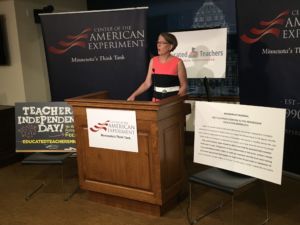Star Tribune Calls on Government Unions to Reform
 The landmark Supreme Court ruling that public employees cannot be forced to fund organized labor as a condition of getting a paycheck continues to reverberate as the ramifications for union bosses and Democratic pols sink in. Big labor’s government gravy train just hit a major obstacle on the tracks in the form of the Janus v. AFSCME decision.
The landmark Supreme Court ruling that public employees cannot be forced to fund organized labor as a condition of getting a paycheck continues to reverberate as the ramifications for union bosses and Democratic pols sink in. Big labor’s government gravy train just hit a major obstacle on the tracks in the form of the Janus v. AFSCME decision.
American Experiment’s Kim Crockett put it this way at a Wednesday press conference and on the Center’s website.
The Court overturned a 1977 decision called Abood v. Detroit Board of Education, holding that public employees do not have to pay agency fees to a union, and that employers must obtain a non-member employee’s “affirmative consent” before deducting any fees from their paycheck.
Even the Star Tribune editorial board acknowledges government worker unions will need to make wholesale changes or risk losing thousands of members, millions of dollars and commensurate political clout.
The blow the U.S. Supreme Court dealt public-employee unions Wednesday was met with so much alarm in some quarters that many Americans are likely to conclude that it was a knockout punch. It is not — at least not in the near term.
But the high court’s decision in Janus vs. AFSCME Council 31 is clearly a turning point, both for public-sector unions and the larger American labor movement. What they do in response will determine whether they wind up “smaller and poorer,” as one analyst predicted, or learn to thrive without being able to compel “agency fee” payments from workers who refuse to join their bargaining unit’s union.
The Strib editorial writer dutifully puts in a disclaimer about the benefits derived from union representation–for government workers, if not always taxpayers. Yet the high court ruling means government unions will need to adapt quickly to stem the loss of members and influence.
The Janus ruling should be heard in both public and private union halls not as a death knell, but as a call to action and reform. It’s a summons to sell a new generation on the value of collective bargaining. It’s a challenge to adapt union practices to the work patterns and emerging industries of the 21st century. It’s a demand to curb the excesses that have turned off otherwise-sympathetic Americans. Union zeal for defending poor employee performance is one such excess. Large financial contributions that flow exclusively to one political party are another.